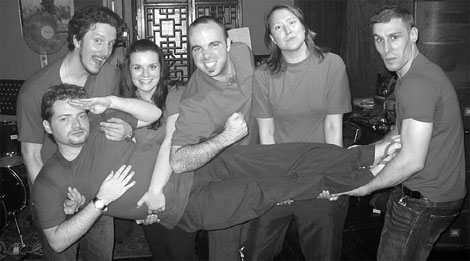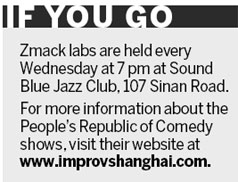Life and Leisure
Improvising a cure for English comedy in Shanghai
By Mary Katherine Smith (China Daily)
Updated: 2010-08-09 14:27
 |
Large Medium Small |
|
 Matthew Schonfield is held aloft by members of Zmack. The performers stage shows regularly in Shanghai. Provided to China Daily |
In the Shanghai entertainment scene, English language comedy was once a rare art. Not any more, Mary Katherine Smith says.
There are few live comedy acts in Shanghai and virtually none in English. To remedy the lack, United States natives Curt Mabry and Matthew Schonfield have made it their mission to bring comedy to a city in need of English-language live theater.
With their live improvisation comedy shows, the pair share a common goal - to make people laugh.
Mabry has lived in Shanghai for two years and was involved with various community theater groups. But with actors coming and going and unable to commit to months of rehearsals for a show, the groups had difficulty surviving in Shanghai's transient environment, he said.
His solution was an improv comedy group called Zmack.
Improv, or improvisational theater, is different from typical stand up comedy because there are no scripts, no pre-written jokes and no rehearsed punch lines. In improv shows, the performers typically use audience suggestions to build scenes. So performers must think quickly on their feet and work together to create and build funny, entertaining scenes.
In its first year, Zmack has grown to host weekly labs, or rehearsals, and monthly improv shows and poetry nights.
The weekly labs attract anywhere from eight to 12 people per week, and performers of many backgrounds play games and learn techniques to help improve their skills.
While the weekly lab is open to anyone, the monthly improv shows feature some of the more seasoned performers. The shows are modeled after the popular US and British TV show Whose Line Is It Any Way, where performers act out improv games that use audience suggestions about the setting, characters, themes, emotions and other elements.

Because they incorporate and include the audience, the shows have become so popular that they usually sell out. And both native and non-native English speakers are interested in the improv labs and performing in shows. "It's a great way to practice conversational English," Mabry says. "People who are fluent in English sometimes seem to enjoy it more than native speakers."
One performer, Tang Fang, who goes by the English name of Candy, has participated in Zmack's labs since April and recently performed for the first time at the group's improv show in July.
Despite the language barriers, the Guangzhou native said she's enjoyed making foreign friends, who are always encouraging, and has gained self-confidence.
Her positive outlook matches what Mabry is looking to accomplish with Zmack. While he hopes that Zmack can grow, he also wants to make sure people are enjoying themselves. "I want to have fun, so I want everyone else to have fun as well."
For Matt Schonfield, who also performs with Zmack, his vision of improv comedy in Shanghai was more of a consistent performing group.
After two years in Shanghai and helping Mabry develop Zmack, the Los Angeles native and former child actor was ready to branch out on his own and develop a comedy group more focused on regular performances.
His group, the People's Republic of Comedy (PRC), performs every other week, attracting a younger audience with its "hipper, edgier" feel. PRC's biweekly shows, also modeled after Whose Line Is It Anyway?, feature a range of improv games fueled from audience suggestions and are a welcomed alternative to the usual weekday happy hours or caf cruising.
Schonfield, or "Chairman Matthew" as he is known at performances, says he pushes the performers hard to create a "group mind" and to train them communicate non-verbally. "Good improv performers can take cues from other actors. They need to be able to communicate without saying anything directly."
The hard work has paid off. In the few months that PRC has performed in Shanghai, the group is already in demand for private and corporate events.
Schonfield says he sees a great opportunity in Shanghai and hopes there will be more outlets for English theater.
"Shanghai is an amazing city," he says. "If you look at great world cities, they all have great cultural lives. I think we're a part of the growing scene in Shanghai."